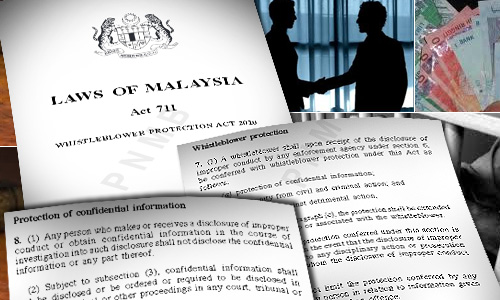
Misuse or abuse of authority, violation of laws and ethical standards, dangers to public health or safety, illegality or mismanagement among others should not be tolerated and hence, every law-abiding citizen should blow the whistle of such wrongdoings and improper conduct in the public and private sector.
Such disclosure is also commanded by the world religions. Enjoying what is right and truth and forbidding evil or wrong is a religious duty of every Muslim and one who failed to discharge this even though he has the ability to do so would be answerable for his omission in the hereafter.
Whistleblowers are mostly internal to an organisation that exposes the alleged corruption and malpractices within the organisation. However, they frequently face reprisal at the hands of the organisation which they have accused.
It comes in many different forms such as shunning, blacklisting, threats, harassment, reprimands, punitive transfers, referral to psychiatrists, demotion and even dismissal.
Such actions often spark fear in them from disclosing any wrongdoings or the improper conducts in the organisation.
Protection against improper conduct disclosure under the Whistleblower Protection Act 2010 is available so long as the disclosure was made in good faith with a reasonable belief of the improper conduct to the designated enforcement agencies specified in the act.
Further, the disclosure must not be prohibited or violates the existing written laws.
The protection under the act comes in the form of confidentiality of the information, immunity from civil and criminal action and protection against retaliatory action or reprisals.
However, the protection under the act is not available when it can be shown that the whistleblower had acted with malice or in bad faith or knowingly made a false report of the improper conduct or where the complaint or communication was made to other than the designated enforcement agency specified in the act.
At the workplace, an employee can refuse to obey the order or instruction of the superior which is illegal, such as the falsification of entries in the company’s books and records or indulging in bribery or corrupt activities.
Further, an employee has a common law duty to make the disclosure of any wrongdoings or improper conducts in the organisation which he knows or has reason to believe exists.
In reality, however, not many are willing to make the disclosure even if an internal whistleblowing policy exists in the organisation. This is because of the fear of retaliation against such disclosure.
The whistleblower should be lauded for the disclosure of the wrongdoing and not vilified or victimised for speaking up the truth.
It would certainly require bravery and courage for a person who is passionate about his beliefs and values to make the disclosure to the trusted channel, irrespective of its consequences.
ASHGAR ALI ALI MOHAMED is a law professor at the International Islamic University Malaysia (IIUM). - Mkini
The views expressed here are those of the author/contributor and do not necessarily represent the views of MMKtT



No comments:
Post a Comment
Note: Only a member of this blog may post a comment.